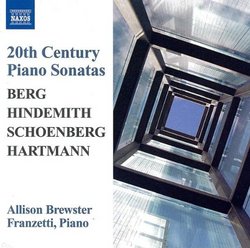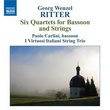| All Artists: Alban Berg, Paul Hindemith, Arnold Schoenberg, Karl Amadeus Hartmann, Allison Brewster Franzetti Title: 20th Century Piano Sonatas Members Wishing: 0 Total Copies: 0 Label: Naxos Original Release Date: 1/1/2007 Re-Release Date: 7/31/2007 Genre: Classical Styles: Chamber Music, Forms & Genres, Sonatas, Historical Periods, Classical (c.1770-1830), Modern, 20th, & 21st Century Number of Discs: 1 SwapaCD Credits: 1 UPC: 747313040179 |
Search - Alban Berg, Paul Hindemith, Arnold Schoenberg :: 20th Century Piano Sonatas
 | Alban Berg, Paul Hindemith, Arnold Schoenberg 20th Century Piano Sonatas Genre: Classical
ALLISON FRANZETTI |
Larger Image |
CD DetailsSynopsis
Product Description ALLISON FRANZETTI Similar CDs
|
CD ReviewsTwo Little-Known 20th-Century Sonatas and More J Scott Morrison | Middlebury VT, USA | 08/06/2007 (4 out of 5 stars) "Aside from the fact that the title of this CD - '20th Century Piano Sonatas' - is misleading on two counts -- the Schoenberg 'Three Pieces' are neither a sonata nor from the twentieth century -- this issue has much going for it. That, however, does not include the opening band, the Berg Sonata, a towering masterpiece of early twentieth-century sonata writing. It is played with somewhat less spine that I would want and has already been recorded magnificently for any number of other pianists. I love the Pollini and Wild recordings, as well as that, also on Naxos, by Peter Hill. And there are many others that render the present account out of the running. The Hindemith Second Piano Sonata is not terribly well known, especially compared to its giant successor, the Third. It is a neo-classically oriented work, almost a sonatina whose debt to Haydn is clear from the beginning. It is given a limpid, light reading by Allison Brewster Franzetti. I was pleasantly surprised by the Three Pieces by Schoenberg (not the familiar Drei Klavierstücke, Op. 11). These are student works, written in 1894 from the period before he began studying with Zemlinsky, and are similar to Brahms's late piano miniatures. They were never published in Schoenberg's lifetime and I'd never encountered them before. The real find, though, is the Piano Sonata '27 April 1945' by Karl Amadeus Hartmann (1905-1963), a composer only now coming into his own in the awareness of music-lovers, primarily through recordings and performances of his symphonies. Written to memorialize the horror of 20,000 Dachau prisoners marched to their deaths just before the final days of World War II, the sonata, in four movements lasting almost half an hour, is a powerful musical statement from Hartmann, a staunch pacifist who had resisted the Nazi government by refusing to allow any of his music to be played in Germany during the War. The third movement, a funeral march, is filled with almost unbearable grief and sorrow. He provided alternate finales to the sonata and both are played here. The first contains a solemn comment on the horrors of the War and quotes, in honor of the conquering forces, folk songs from both the United States and the Soviet Union. The second finale replaces the sostenuto passage in the first finale with a ghostly toccata. Brewster Franzetti gives the sonata an effective reading. The recorded sound leaves something to be desired. It is, to my ears, over-reverberant. Further, the Blüthner piano used does not have a particularly appealing tone. Still, for the early Schoenberg pieces and the Hindemith and Hartmann sonatas, this is a welcome issue. Scott Morrison" Very worthwhile musikwissenschaft | 05/07/2008 (4 out of 5 stars) "Largely agree with other reviewers: this is a neglected rarity, and very interesting. Franzetti has chosen her selection well, since Hartmann does owe a great deal to Hindemith and Berg, and the Schoenberg pieces are not well known. (The Hindemith 2nd Sonata is less monumental than the Third, but still a good representative work; the Third would not have fit on one disc with Hartmann.) A bargain, a consistent program, and well performed. (Note that the pianist offers us both versions of the Hartmann Sonata finale!)"
|

 Track Listings (12) - Disc #1
Track Listings (12) - Disc #1


